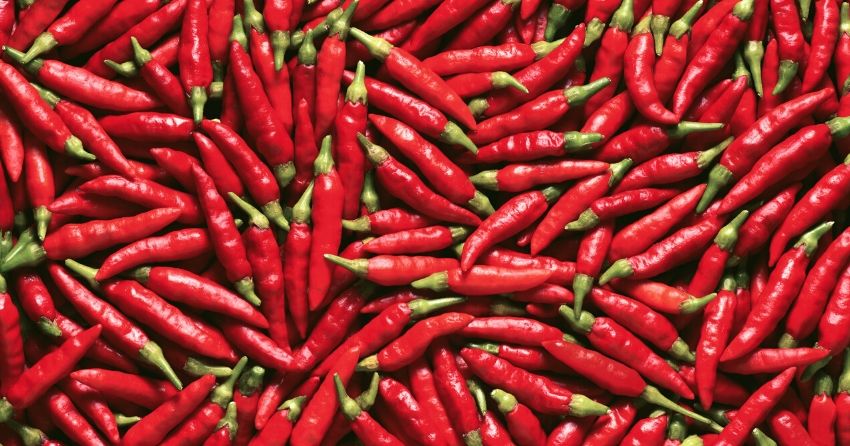Study Finds Eating Chili Peppers Reduces Risk of Cardiac-Related Death

-
Consuming hot chili peppers 4 times per week or more was linked to a reduction in cerebrovascular mortality or mortality following a heart attack in an Italian study.
-
Capsaicin is the compound that makes peppers spicy and has been previously linked to improved health.
This article was published on EurekAlert.org.
Chili pepper is a common guest in Italians kitchens, and over the centuries it has been praised for its supposed therapeutic virtues. Now an Italian research shows that people who consume it on a regular basis have a mortality risk for every cause reduced by 23% compared to those who do not like it. The study, published in the Journal of the American College of Cardiology (JACC), has been conducted by the Department of Epidemiology and Prevention of I.R.C.C.S. Neuromed in Pozzilli, Italy, in collaboration with the Department of Oncology and Molecular Medicine of the Istituto Superiore di Sanità in Rome, the University of Insubria in Varese and the Mediterranean Cardiocentro in Naples.
The research examined 22,811 citizens of Molise region, in Italy, participating in the Moli-sani study. Following their health status for an average period of about 8 years, and comparing it with their eating habits, Neuromed researchers observed that, in people regularly consuming chili pepper (4 times a week or more), the risk of dying of a heart attack was cut down by 40%. Risk reduction for cerebrovascular mortality was even higher since it resulted more than halved.
"An interesting fact - says Marialaura Bonaccio, Neuromed epidemiologist and first author of the publication - is that protection from mortality risk was independent of the type of diet people followed. In other words, someone can follow the healthy Mediterranean diet, someone else can eat less healthily, but for all of them chili pepper has a protective effect".
The Moli-sani study is the first to explore the properties of this spice in relation to the risk of death in a European and Mediterranean population.
"Chili pepper - comments Licia Iacoviello, Director of the Department of Epidemiology and Prevention at the I.R.C.C.S. Neuromed and Professor of Hygiene and Public Health at the Università dell'Insubria of Varese - is a fundamental component of our food culture. We see it hanging on Italian balconies, and even depicted in jewels. Over the centuries, beneficial properties of all kinds have been associated with its consumption, mostly on the basis of anecdotes or traditions, if not magic. It is important now that research deals with it in a serious way, providing rigor and scientific evidence. And now, as already observed in China and in the United States, we know that the various plants of the capsicum species, although consumed in different ways throughout the world, can exert a protective action towards our health".
New researches will be now necessary to understand the biochemical mechanisms through which the chili pepper and its "relatives" (all united by the presence of a substance called capsaicin), scattered in all the corners of the globe, act. But for the time being, spicy food lovers surely have one more reason to maintain their habit.
The Moli-sani Study:
Started in March 2005, it involves about 25,000 citizens living in the Molise region. The aim is to learn about environmental and genetic factors underlying cardiovascular disease, cancer and degenerative pathologies. The Moli-sani Study, now based in the I.R.C.C.S. Neuromed, has transformed an entire Italian region in a large research lab.
The study was published in the Journal of the American College of Cardiology in December 2019.





